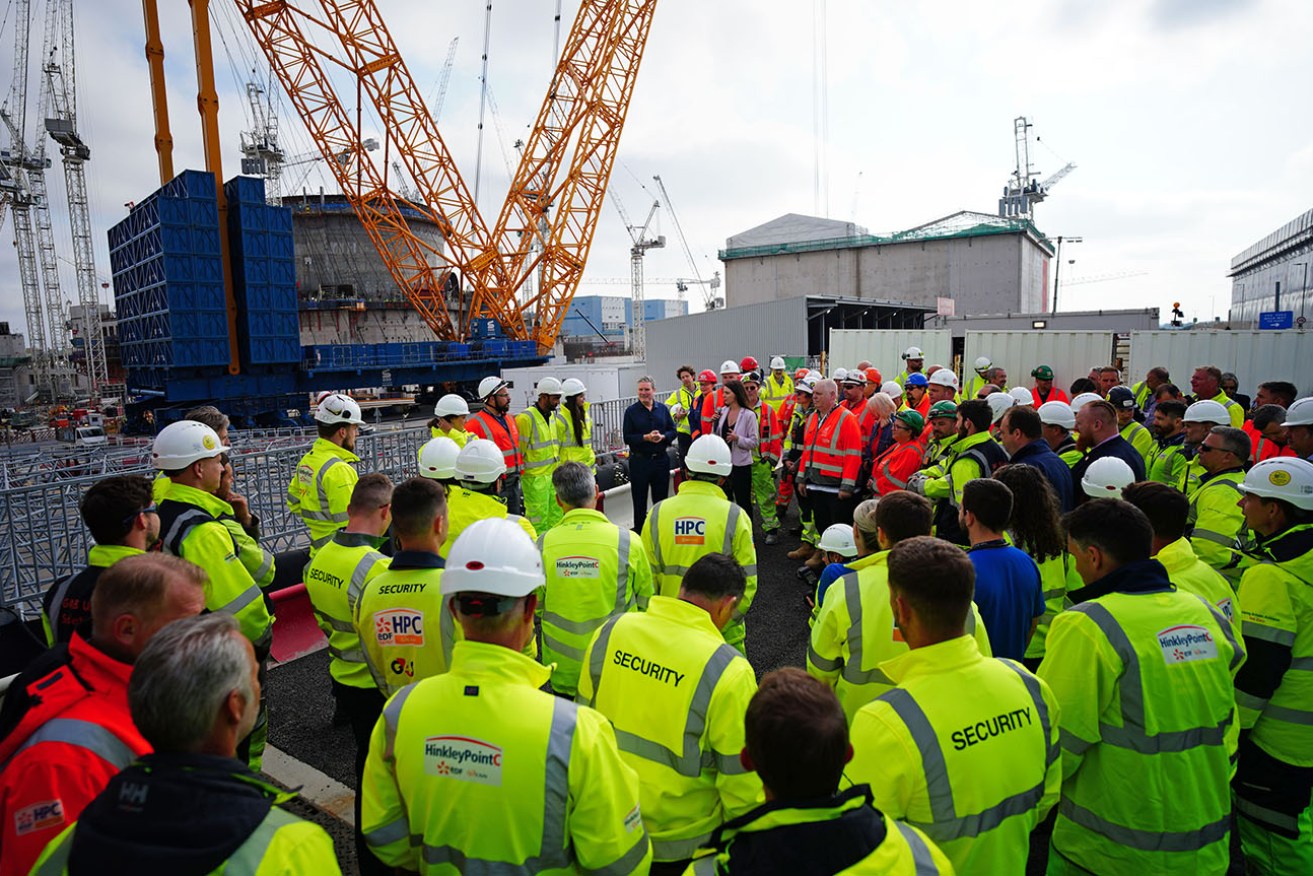Merry dance: The legal fandango over coal sets the stage for any switch to nuclear


Sir Keir Starmer speaks to workers at the Hinkley Point nuclear power station in Somerset in June 2023. Photo: PA via Getty
When the Hinkley nuclear power station in the UK was first proposed it was expected to cost about $17 billion and would generate enough power for six million homes.
It was expected to be completed in 2017.
That’s now looking a tad naïve. The flagship of Britain’s nuclear expansion is now likely to cost $90 billion and come online around 2031.
That’s not an outlier.
The latest costs
According to Alan Finkel in 360info.org, a 5.6 gigawatt nuclear power plant in the United Arab Emirates has taken 16 years to develop at cost of $US24 billion ($36 billion).
Another one in the US has cost $52 billion.
The uncosted Coalition plan is for seven, two of which would be in Queensland.
It effectively takes away energy generation from the states.
Issues aplenty
There are so many legal, political, corporate and logistic issues with the Coalition’s nuclear strategy that it makes the nuclear submarine deal look well run.
If you think the Opposition is right in saying we could have a nuclear power station up and running in just over a decade I’ll give you two words: New Hope.
Its relatively small expansion of a coal mine near Oakey took somewhere between 12 and 15 years to go through government approvals because of all the legal objections thrown at it by environmental groups.
To sidestep that, what Dutton will need is for a possible LNP state government to block the environmentalists from using the legal process in the courts to delay and disrupt any nuclear power station in Queensland.
Environmental strategy
This was the strategy the environmental groups used so effectively more than a decade ago when it appeared that the Galilee Basin in central Queensland was about to become the site of massive coal mines to feed the economies of Asia.
Back when the Newman government was in power it introduced legislative change at midnight to restrict the legal opposition to coal and smooth the path for developments, but that was later reversed by the Palaszczuk government.
Any hope of that legal fandango being repeated has its own stumbling block.
Stumbling blocks
First of all, the LNP has to win the next election, which, as we have seen from previous performances, is not a sure bet.
And State Opposition leader David Crisafulli has already said he is opposed to nuclear so Dutton will have to move a few mountains to change that roadblock.
He’d also have to get Crisafulli to overturn a legislated ban on nuclear.
The Senate would also have to agree to overturn a federal ban, which would require a significant change in the current make-up of the upper house where the Greens and independents have a big voice.
The environmental strategy of obstruct and delay through the courts worked, kind of.
Tactics success
Adani, now Bravus, was not stopped, but that was mostly to do with the fact that the company was more belligerent and far richer than the environmental groups that opposed it.
A lot of other companies, like Gina Rinehart’s, folded their tables and walked away as the market for coal changed and the mood against them turned sour.
And of course, Clive Palmer suffered an embarrassing blow to his coal project in the Queensland courts when a small group of activists opposed him.
And that’s still going on. Winchester South is facing legal appeals as is another coal mine in the Hunter Valley.
And judging by the outcry from those same environmental groups about Dutton’s plan you can be assured they will have a crack at nuclear.
Compulsory acquisitions
Another problem is the sites themselves, but Dutton has suggested there was a Commonwealth power for compulsory acquisition.
Then there are the communities surrounding the projects which will have little say in what occurs.
It would be naive to think we should never consider nuclear power.
Technology is changing rapidly and fusion energy, while still embryonic, is a possibility we should not ignore.
Small modular reactors could potentially be a game changer, but there is no commercial evidence of that.
This article first appeared in InQld. See the original article here








